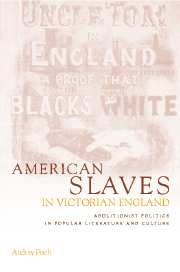Book contents
- Frontmatter
- Contents
- Acknowledgments
- Introduction:Communicating “a correct knowledge of American Slavery”: J. B. Estlin and the “breeder” in Frederick Douglass's Narrative
- 1 “Exhibiting Uncle Tom in some shape or other”: the commercialization and reception of Uncle Tom's Cabin in England
- 2 Abolition as a “step to reform in our kingdom”: Chartism, “white slaves,” and a new “Uncle Tom” in England
- 3 “Repetitious accounts so piteous and so harrowing”: the ideological work of American slave narratives in England
- 4 “Negrophilism” and nationalism: the spectacle of the African-American abolitionist
- Epilogue:“How cautious and calculating”: English audiences and the impostor, Reuben Nixon
- Notes
- Bibliography
- Index
Introduction:Communicating “a correct knowledge of American Slavery”: J. B. Estlin and the “breeder” in Frederick Douglass's Narrative
Published online by Cambridge University Press: 20 February 2010
- Frontmatter
- Contents
- Acknowledgments
- Introduction:Communicating “a correct knowledge of American Slavery”: J. B. Estlin and the “breeder” in Frederick Douglass's Narrative
- 1 “Exhibiting Uncle Tom in some shape or other”: the commercialization and reception of Uncle Tom's Cabin in England
- 2 Abolition as a “step to reform in our kingdom”: Chartism, “white slaves,” and a new “Uncle Tom” in England
- 3 “Repetitious accounts so piteous and so harrowing”: the ideological work of American slave narratives in England
- 4 “Negrophilism” and nationalism: the spectacle of the African-American abolitionist
- Epilogue:“How cautious and calculating”: English audiences and the impostor, Reuben Nixon
- Notes
- Bibliography
- Index
Summary
You will understand my feelings (perhaps you may call it fastidiousness) when I say, that being most desirous to communicate extensively a correct knowledge of American Slavery in this city, and rejoicing in having such an excellent opportunity of doing so as Douglass's Narrative furnished me with, I could not circulate it among my friends and especially among ladies (young ones particularly) until I had erased all the paragraphs after the statement that Covey intended the woman be bought for a “breeder.” The minutia following, that he hellip; shut him up with the woman every night for a year, and that the result was twins, are unnecessary and disgusting … [such sections would offend] English taste and impede the sale of the book.
(J. B. Estlin to J. Otis, Bristol, 1845)[Mr. Covey] may be said to have been guilty of compelling his woman slave to commit the sin of adultery. The facts in this case are these: Mr. Covey was a poor man; and he was just commencing in life; he was only able to buy one slave; and, shocking as is the fact, he bought her, as he said for a breeder [original emphasis]. This woman was named Caroline. Mr. Covey bought her from Mr. Thomas Lowe, about six miles from St. Michael's. She was a large and able-bodied woman, about twenty years old. She had already given birth to one child, which proved her to be just what he wanted. […]
- Type
- Chapter
- Information
- American Slaves in Victorian EnglandAbolitionist Politics in Popular Literature and Culture, pp. 1 - 10Publisher: Cambridge University PressPrint publication year: 2000



